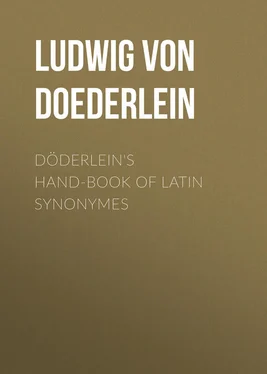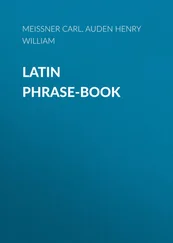Ludwig Doederlein - Döderlein's Hand-book of Latin Synonymes
Здесь есть возможность читать онлайн «Ludwig Doederlein - Döderlein's Hand-book of Latin Synonymes» — ознакомительный отрывок электронной книги совершенно бесплатно, а после прочтения отрывка купить полную версию. В некоторых случаях можно слушать аудио, скачать через торрент в формате fb2 и присутствует краткое содержание. Издательство: Иностранный паблик, Жанр: Языкознание, foreign_antique, foreign_prose, на английском языке. Описание произведения, (предисловие) а так же отзывы посетителей доступны на портале библиотеки ЛибКат.
- Название:Döderlein's Hand-book of Latin Synonymes
- Автор:
- Издательство:Иностранный паблик
- Жанр:
- Год:неизвестен
- ISBN:нет данных
- Рейтинг книги:3 / 5. Голосов: 1
-
Избранное:Добавить в избранное
- Отзывы:
-
Ваша оценка:
- 60
- 1
- 2
- 3
- 4
- 5
Döderlein's Hand-book of Latin Synonymes: краткое содержание, описание и аннотация
Предлагаем к чтению аннотацию, описание, краткое содержание или предисловие (зависит от того, что написал сам автор книги «Döderlein's Hand-book of Latin Synonymes»). Если вы не нашли необходимую информацию о книге — напишите в комментариях, мы постараемся отыскать её.
Döderlein's Hand-book of Latin Synonymes — читать онлайн ознакомительный отрывок
Ниже представлен текст книги, разбитый по страницам. Система сохранения места последней прочитанной страницы, позволяет с удобством читать онлайн бесплатно книгу «Döderlein's Hand-book of Latin Synonymes», без необходимости каждый раз заново искать на чём Вы остановились. Поставьте закладку, и сможете в любой момент перейти на страницу, на которой закончили чтение.
Интервал:
Закладка:
Axilla, see Armus .
B
Balbus; Blæsus. Balbus (from balare) denotes stammering as an habitual quality, whereas Blæsus, as a temporary condition. (iii. 79.)
Baculus, see Fustis .
Bajulare, see Ferre .
Bardus, see Stupidus .
Basium, see Osculum .
Baubari, see Latrare .
Beatus, see Felix .
Bellua, see Animal .
Bene moratus, see Bonus .
Benevolentia, see Studium .
Benignus, see Largus .
Bestia, see Animal .
Bibere; Potare. Bibere (reduplic. of bua) means to drink like a human being, πίνειν; whereas potare (from ποτός) to drink like a beast, and, metaphorically, to tipple, σπᾶν. Sen. Ep. 122. Inter nudos bibunt , imo potant . Plaut. Curc. i. 1, 88. Agite, bibite , festivæ fores, potate , fite mihi volentes propitiæ. (1. 149.)
Bifariam, see Duplex .
Bilis, see Fel .
Blæsus, see Balbus .
Blandiri, see Assentiri .
Blatire, Blaterare, see Garrire .
Boni consulere, see Satis habere .
Bonus; Bene moratus; Probus; Frugi; Honestus; Sanctus. 1. Bonus, bene moratus, probus, and frugi, denote a low degree of morality, in which a man keeps himself free from blame and punishment, hatred and contempt: – bonus (anciently duonus, δύναμαι), in the popular sense, in which benevolence and goodness of heart constitute the principal part of morality, in opp. to malus , like ἀγαθός; bene moratus, in a more philosophical sense, as an acquired character, in which, before all things, self-control, conscientiousness, and freedom from common selfishness are cultivated, like εὔτροπος, probus πραΰς), so far as a man injures no one, nor does what is unjust, as a worthy, upright, just man; frugi, so far as a man, by discretion, conscientiousness, and diligence, qualifies himself to be useful in practical life, in opp. to nequam , like χρηστός. Quintil. vi. 4, 11. Non est altercandi ars.. res animi jacentis et mollis supra modum frontis, fallitque plerumque quod probitas vocatur, quæ est imbecillitas. Dic. Dejot. 10. Frugi hominem dici non multum laudis habet in rege. Quintil. i. 6, 29. 2. Whereas honestus and sanctus denote a higher degree of morality, which, from higher motives, rises above the standard of ordinary men, and what is called social morality; honestus, as an honorable and chivalrous spirit and demeanor, derived from a principle of honor and distinction, in opp. to turpis ; sanctus, as a saintly and holy spirit, derived from a principle of piety. (v. 347.)
Brachium, see Ulna .
Brevis; Curtus. Brevis (βραχύς) means short by nature; whereas curtus (καρτός, from κείρω), means shortened.
Brutus, see Stupidus .
C
Caballus, see Equus .
Cachinnari, see Ridere .
Cacumen, see Acies .
Cadaver; Corpus. Cadaver denotes the dead body as a mere material substance, like carcass : but corpus as the remains of personality, like corpse , and is always used when the dead body is spoken of with feeling. (vi. 45.)
Cadere, see Labi .
Cædere, see Verberare .
Cærimonia, see Consuetudo .
Cæsar, see Primus .
Cæsaries, see Crinis .
Cæteri; Reliqui. Cæteri (comparat. from ἐκεῖ) denotes others, as in direct opposition to those first mentioned, like οἱ ἄλλοι; whereas reliqui, the rest, as merely the remainder that complete the whole, like οἱ λοιποί. Cic. Brut. 2, 6. Si viveret Hortensius, cætera fortasse desideraret una cum reliquis bonis civibus; hunc aut præter cæteros , aut cum paucis sustineret dolorem. (i. 183.)
Calamitas, see Infortunium .
Calamus, see Culmus .
Calculus, see Saxum .
Calere; Fervere; Æstuare; Calefacere; Fovere. 1. Calere and fervere denote, objectively, warmth by itself, and, indeed, calidus (κηλέῳ πυρί), in opp. to frigidus , a moderate degree of warmth, but fervidus, in opp. to gelidus , a degree of warmth on the point of boiling, heat; whereas æstuare (from αἴθω), subjectively, the feeling of heat, in opp. to algere . (iii. 89.) 2. Calefacere means to make warm, in a purely physical sense, without any accessory notion; whereas fovere (from ἀφαύω), with reference to the genial sensation, or salutary effect of the warmth. (vi. 48.)
Caligo, see Obscurum .
Calix, see Poculum .
Callidus, see Astutus and Sapiens .
Callis, see Iter .
Campus, see Æquum and Villa .
Candela; Lucerna. Candela is a candle, which can be carried about like a torch, as λαμπάς, whereas lucerna can only be considered as a burning light on a table, like λύχνος. (vi. 50.)
Candidus, see Albus .
Canere; Cantare; Psallere; Canticum; Cantilena; Carmen; Poema; Poeta; Vates. 1. Canere (from καναχεῖν) means, in the most general sense, to make music, voce, tibiis, fidibus, like μέλπειν; cantare, with vocal music, like ἀείδειν; psallere, with instrumental music, and indeed with string-instruments, like ψάλλειν. 2. Cantica and cantilenæ are only songs adapted for singing, in which, as in popular ballads, the words and melodies are inseparable, and serve to excite mirth and pleasure, in opp. to speech, and that which is spoken; and, indeed, canticum means a favorite piece, still in vogue; cantilena, a piece which, being generally known, has lost the charm of novelty, and is classed with old songs; whereas carmina and poemata are poems which may be sung, but the words of which claim value as a work of art, and serve religion or music as an art, in opp. to prose and real truth; carmina, indeed, were originally religious hymns, ἐπῳδαί, and, in a wider sense, poems of another sort, mostly, however, minor poems, and of a lyrical sort, like ᾠδαι; but poemata are the products of cultivated art, and extensive poems, mostly of the epic or tragic sort, like ποιήματα. The carmen (κάρω, κράζω) is the fruit of natural, but the poema of calm and self-conscious inspiration. 3. Poeta is a technical expression, and denotes a poet only as an artist; vates (ἠχέτης) is an old Latin and religious expression, and denotes a poet as a sacred person. Tac. Dial. 9. (v. 99.)
Canna, see Culmus .
Cantare, see Canere .
Canterius, see Equus .
Canticum, Cantilena, see Canere .
Caper; Hircus; Hœdus. Caper (κάπρος) is the general name for a he-goat, and that which is used in natural history, τράγος; hircus (from χήρ) is an old full-grown he-goat, χίμαρος? whereas hædus, hœdus (χοῖρος), a kid, ἔριφος. (v. 336.)
Capere, see Sumere .
Capillus, see Crinis .
Carcer, see Custodia .
Carere; Egere; Indigere. 1. Carere (from κείρειν) relates to a desirable possession, in opp. to habere , Cic. Tusc. i. 36; whereas egere and indigere, to a necessary and indispensable possession, in opp. to abundare , Lucil. Fr. Sat. viii. Senec. Vit. B. 7. Voluptate virtus sæpe caret , nunquam indiget . Epist. 9. Sapiens eget nulla re; egere enim necessitatis est. Cic. Ep. ad. Qu. Fr. i. 3, 2. Nunc commisi, ut me vivo careres , vivo me aliis indigeres . 2. Egere (from χάω, χαίνω ἀχήν) denotes, objectively, the state of need, in opp. to uti , Cato ap. Gell. xiii. 23; indigere, subjectively, the galling sense of need, and eager longing to satisfy it. (iii. 113.)
Читать дальшеИнтервал:
Закладка:
Похожие книги на «Döderlein's Hand-book of Latin Synonymes»
Представляем Вашему вниманию похожие книги на «Döderlein's Hand-book of Latin Synonymes» списком для выбора. Мы отобрали схожую по названию и смыслу литературу в надежде предоставить читателям больше вариантов отыскать новые, интересные, ещё непрочитанные произведения.
Обсуждение, отзывы о книге «Döderlein's Hand-book of Latin Synonymes» и просто собственные мнения читателей. Оставьте ваши комментарии, напишите, что Вы думаете о произведении, его смысле или главных героях. Укажите что конкретно понравилось, а что нет, и почему Вы так считаете.












